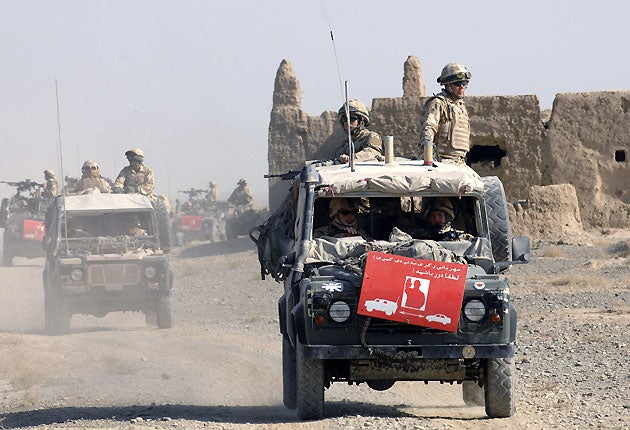Bloody summer for UK troops in Taliban country

Your support helps us to tell the story
From reproductive rights to climate change to Big Tech, The Independent is on the ground when the story is developing. Whether it's investigating the financials of Elon Musk's pro-Trump PAC or producing our latest documentary, 'The A Word', which shines a light on the American women fighting for reproductive rights, we know how important it is to parse out the facts from the messaging.
At such a critical moment in US history, we need reporters on the ground. Your donation allows us to keep sending journalists to speak to both sides of the story.
The Independent is trusted by Americans across the entire political spectrum. And unlike many other quality news outlets, we choose not to lock Americans out of our reporting and analysis with paywalls. We believe quality journalism should be available to everyone, paid for by those who can afford it.
Your support makes all the difference.The fate of the war in Afghanistan could be decided in the next few months in sweltering villages like this one alongside a highway that cuts through Helmand province, the heartland of the Taliban.
Over coming weeks the biggest wave of reinforcements sent by US President Barack Obama will arrive in an area where insurgents control the villages by night and the fields produce most of the world's opium.
And today it was announbced that a soldier from The Royal Marines Armoured Support Group was killed when an explosion hit a Viking vehicle near Lashkar Gah in Helmand, the sixth UK soldier to die in eight days. A total of 159 UK troops have died in Afghanistan since 2001.
For now, British "Black Watch" soldiers from 3 Scots regiment are still patrolling in Taliban country, surrounded by an enemy that they know lies in wait.
"Since the Russians, we're probably going to be the largest force descending down on these people," Major Al Steele, the regiment's B company commander, told his men before they set out in helicopters at dawn to be dropped into Yakhchal village.
"This is not a benign area. You always need to be poised for action," he warned.
For three years, a British force battling the Taliban in Helmand has been stretched too thin across the province's brutal deserts and high peaks.
Western troops can now secure just 60 percent of the population in the south of Afghanistan, said British Brigadier David Hook, deputy commander of the Nato force in the south.
They hope the new US troops will make it possible to expand that to 90 percent by the end of the summer fighting season. US troop numbers will rise from the current level of 45,000 to 68,000 later this year.
In between, they expect a "bloody summer" as the huge new US contingent deploys into southern areas firmly under sway of the militants.
"Clearly, an influx of Americans will increase the force levels in the most dangerous parts of Afghanistan," said Lieutenant Colonel Stephen Cartwright, Commander of 3 Scots.
"It will improve the security where we would perhaps admit to not having enough troops on the ground to provide that security."
When the British were first sent to Helmand three years ago, it was billed as a humanitarian mission to protect development projects. But since then, they have been involved in some of their most intense fighting since the Korean War 50 years ago.
More than 8,000 British troops have been trying to secure the population centres either side of the Helmand River that cuts its way through the province.
But because of insufficient troop strength, soldiers often conduct operations only to pull back to their base, leaving the population exposed.
Steele's B company flew by helicopter into Yakhchal last week on a mission to "understand" the population - not to engage militants - in villages along a stretch of strategic highway.
But shortly after they landed, the crack of gunfire broke the silence. The lead platoon had come under attack. Afghan soldiers accompanying the British troops immediately returned fire.
"You'd better get against the wall," a soldier shouted at an accompanying Reuters reporter. "The rounds are landing just behind you."
The insurgents had set up a second firing position and bullets were hitting tree branches above the rest of the company's heads. "This is what we came out here for!" shouted another soldier, smiling and leading his men to cover.
For the next several hours, the company came under sporadic fire from secluded positions among the warren of mud houses. By the end of the day, two insurgents had been killed and one British soldier shot in the arm from an exposed position on the roof of a compound. He was evacuated by helicopter.
For four more days, B company slept rough, entering villages along the stretch of Highway 1 east of Girishk town.
"We're trying to get a feel from the local nationals as to their requirements ... and also learn from them a little bit more about the insurgent and what he's up to," said Steele.
There is little trust between the British and a population who know, for now, that the Taliban hold sway.
A bearded man told the British soldiers he hadn't seen the Taliban for years. But later, one of the insurgents' firing positions was traced back to the same man's compound.
Even the friendly locals are wary of siding with a force that controls the terrain only by day.
"It's good they (foreign troops) are here," said one man, who had let the British soldiers rest in his compound in Muslimabad, a village along the highway. "Anyone who wants to bring peace to this country is good.
"But the Taliban will come to my house tonight and ask me what I told the soldiers," he said, declining to give his name.
Join our commenting forum
Join thought-provoking conversations, follow other Independent readers and see their replies
Comments